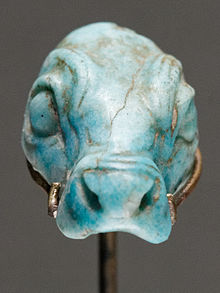Kadashman-Turgu
| Kadašman-Turgu | |
|---|---|
| King of Babylon | |

Zoomorph amulet with an inscription in the name of Kadashman-Turgu, Louvre Museum
|
|
| Reign | ca. 1281–1264 BC |
| Predecessor | Nazi-Maruttaš |
| Successor | Kadašman-Enlil II |
| House | Kassite |
Kadašman-Turgu, inscribed Ka-da-aš-ma-an Túr-gu and meaning he believes in Turgu, a Kassite deity, (1281–1264 BC short chronology) was the 24th king of the Kassite or 3rd dynasty of Babylon. He succeeded his father, Nazi-Maruttaš, continuing the tradition of proclaiming himself lugal ki-šár-ra or “king of the world” and went on to reign for eighteen years. He was a contemporary of the Hittite king Ḫattušili III, with whom he concluded a formal treaty of friendship and mutual assistance, and also Ramesses II with whom he consequently severed diplomatic relations.
Kadašman-Turgu reigned during momentous times, but seems to have played only a peripheral role. Ḫattušili III, in a letter to his son and successor Kadašman-Enlil II, said of him, “they used to call [your father] a king who prepares for war but then stays at home”. His personal seal included suckling animals in two registers, allegorically symbolizing his care for his subjects. The continued employment of the extinct Sumerian language in royal votive inscriptions was in decline and the Babylonian calendar was under revision with the introduction of the Akkadian term: Šanat rēš šarrūti, “accession year.”
Early in his reign, he brokered a treaty with the Assyrian king Adad-Nīrāri, preserved on a fragmentary clay tablet where the phrase “he pardoned his son of the crime” appears twice. Kadašman-Enlil’s father, Nazi-Maruttaš had been engaged in a protracted war with both Adad-Nīrāri and his father Arik-den-ili which had reached its dénouement in a battle at "Kār-Ištar of Ugarsallu". This settlement perhaps explains why there were no reports of any conflict between the Babylonians and Assyrians during this time. It also freed the Assyrians to turn their attention to conquering their westerly neighbor and former overlord the Mitanni.
...
Wikipedia
